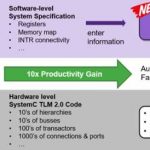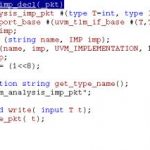Innovation is never ending in verification, for performance, coverage, connection to verification plans and other aspects of DV. But debug, accounting for 40% of the verification cycle, has remained stubbornly resistant to significant automation. Debug IDEs help to visualize but don’t address the core problem: given a failure,… Read More
Tag: debug
AI in Verification – A Cadence Perspective
AI is everywhere or so it seems, though often promoted with insufficient detail to understand methods. I now look for substance, not trade secrets but how exactly they using AI. Matt Graham (Product Engineering Group Director at Cadence) gave a good and substantive tutorial pitch at DVCon, with real examples of goal-centric optimization… Read More
Finally, A Serious Attack on Debug Productivity
Verification technologies have progressed in almost all domains over the years. We’re now substantially more productive in creating tests for block, SoC and hybrid software/hardware verification. These tests provide better coverage through randomization and formal modeling. And verification engines are faster – substantially… Read More
Getting to Faster Closure through AI/ML, DVCon Keynote
Manish Pandey, VP R&D and Fellow at Synopsys, gave the keynote this year. His thesis is that given the relentless growth of system complexity, now amplified by multi-chiplet systems, we must move the verification efficiency needle significantly. In this world we need more than incremental advances in performance. We need… Read More
Embedded Analytics Becoming Essential
SoC integration offers huge benefits through reduced chip count in finished systems, higher performance, improved reliability, etc. A single die can contain billions of transistors, with multiple processors and countless subsystems all working together. The result of this has been rapid growth of semiconductor content … Read More
What are you ready to mobilize for FPGA debug?
There are 3 common misconceptions about debugging FPGA with the real hardware:
[LIST=1]
Optimizing Prototype Debug
In the spectrum of functional verification platforms – software-based simulation, emulation and FPGA-based prototyping – it is generally agreed that while speed shoots up by orders of magnitude (going left to right) ease of debug drops as performance rises and setup time increases rapidly, from close to nothing for simulation… Read More
Getting out of DIY Mode for Virtual Prototypes
Virtual prototyping has, inexplicably, been largely a DIY thing so far. Tools and models have come from different sources with different approaches, and it has been up to the software development team to do the integration step and cobble together a toolchain and methodology that fits with their development effort.
That integration… Read More
A New Player in the Functional Verification Space
Israel has a strong pedigree in functional verification. Among others, Verisity (an early contributor to class-based testbench design and constrained random testing) started in Israel and RocketTick (hardware-based simulation acceleration), acquired more recently by Cadence, is based in Israel. So when I hear about an … Read More
Learn How to Debug UVM Test Benches Faster – Upcoming Synopsys Webinar
UVM for developing testbenches is a wonderful thing, as most verification engineers will attest. It provides abstraction capabilities, it encapsulates powerful operations, it simplifies and unifies constrained-random testing – it has really revolutionized the way we verify at the block and subsystem level.
However great… Read More










